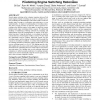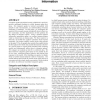1104 search results - page 32 / 221 » Understanding Human Behavior Using a Language Modeling Appro... |
EXPERT
2002
15 years 1 months ago
2002
er than abstracting human behavior as work processes or tasks--functional idealizations of the work to be accomplished--we model people's activities comprehensively and chrono...
128
click to vote
SIGIR
2011
ACM
14 years 5 months ago
2011
ACM
Search engine switching is the voluntary transition between Web search engines. Engine switching can occur for a number of reasons, including user dissatisfaction with search resu...
118
click to vote
WWW
2007
ACM
16 years 2 months ago
2007
ACM
The aggregation and comparison of behavioral patterns on the WWW represent a tremendous opportunity for understanding past behaviors and predicting future behaviors. In this paper...
116
click to vote
ATAL
2008
Springer
15 years 4 months ago
2008
Springer
Computer agents participate in many collaborative and competitive multiagent domains in which humans make decisions. For computer agents to interact successfully with people in su...
135
click to vote
MODELS
2010
Springer
15 years 16 days ago
2010
Springer
Formal analysis can be used to verify that a model of the system adheres to its requirements. As such, traditional formal analysis focuses on whether known (desired) system propert...


